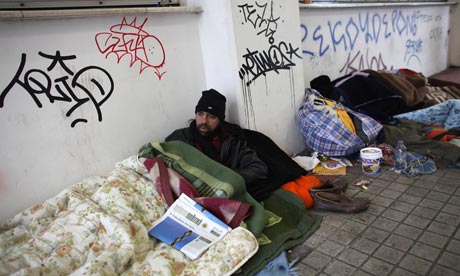
'The number of homeless people has risen to unprecedented levels for a European country: unofficial estimates put them at 40,000.' Photograph: Oli Scarff/Getty Images
European societies typically assume that humanitarian crises only take place in the aftermath of natural disasters, epidemics, wars or civil conflicts.That such a crisis could happen in a European country, especially one that is a member of the European Union, seems out of the question to many of us.
And yet a number of experts would maintain that Greece is currently in the centre of a humanitarian crisis. The head of Médecins du Monde, Nikitas Kanakis, the largest and most prominent NGO in Greece, was among the first to declare it openly. The port area of Perama, near Athens, in particular, is in the midst of a humanitarian disaster. The Medical Society of Athens, the largest professional body of its kind, has even sent a formal letter to the UN asking for intervention.
If this humanitarian crisis has so far been little talked about, there are political reasons why. By acknowledging the severity of the situation, the Greek government and the EU would also have admitted that the current state of affairs has been brought about by the so-called economic "rescue" of Greece. So the authorities have chosen to keep quiet.
It is true that there is no general agreement on what constitutes a humanitarian crisis. But the definition used by those with experience in the field is practical and straightforward. A humanitarian crisis is usually marked by rising poverty, heightened inequality in education and social protection, and lack of access to social welfare services. Particularly important indicators are loss of access to primary health services, medical examinations, hospitalisation and medication. In other words: when you see a crisis, you will not mistake it for anything else.
Greece never imagined that it could face a humanitarian crisis. According to the UN Human Development Index, in 2008 Greece was ranked 18th in the world. No one in the country really thought that this could change so dramatically.
It was false security offered by the institutions and mechanisms of the EU. Member states had to pay for this imaginary security by meeting demanding economic and political criteria. The paradox is that even the EU, the supposed guarantor of the security and prosperity of member states, has well-defined ways of measuring poverty, both absolute and relative, which show that a humanitarian crisis exists in Greece.
On the basis of the criteria and the data of the EU, Greece is a country in serious poverty. In 2011, 31.4% of the population, or 3.4 million people, lived on an income below 60% of the national median disposable income. At the same time, 27.3% of the population, or 1.3 million people, were at risk of poverty. There is no data yet for 2012, though things have certainly got worse.
Using further EU indicators, a large proportion of Greek households currently live in conditions of "material deprivation". A little more than 11% actually live in "extreme material deprivation", which means without enough heating, electricity, and use of either a car or a telephone. It also means having a poor diet, devoid of meat or fish on a weekly basis, as well as total or partial inability to meet emergency expenses or payments for rent and bills.
The ineffectiveness of European programmes for reintegrating the unemployed into the labour market and the lack of national social protection programmes have pushed Greece even further down the ranks of poverty. The adult unemployment rate stood at 26.8% in October 2012. This level, although huge in comparison to the recent past, still does not give the whole picture.
It misses, for instance, unemployment resulting from the failure of thousands of small businesses. To the unemployed should be added the working poor, ie, workers with such low wages that they cannot meet basic needs. At 13% of the workforce they represent the highest proportion of the working poor in the eurozone.
There are three more indicators that point to a humanitarian crisis. First, the number of homeless people has risen to unprecedented levels for a European country: unofficial estimates put them at 40,000. Second, the proportion of Greek beneficiaries of NGO medical services in some urban centres was recorded at 60% of the total in 2012. This would have been unthinkable even three years ago, since such services were typically provided to immigrants, not Greeks.
Third, there has been explosive growth in soup kitchens and general food distribution. The levels are not officially recorded, but the Church of Greece distributes approximately 250,000 daily rations, while there are unknown numbers of rations distributed by municipal authorities and NGOs. By recent government order, municipal rations will be expanded further because of rising incidence of children fainting at school due to low calorie intake. There will also be light meals provided to young students.
The evidence of poverty, inequality, and inability to access primary services confirms the increasingly desperate statements by people at the frontline. The country has become a field of humanitarian action, and should be treated as such. It is shameful for the Greek government and the EU to turn a blind eye to it. The international humanitarian community should respond with urgency.
read more at http://www.guardian.co.uk/commentisfree/2013/feb/11/greece-humanitarian-crisis-eu
Δεν υπάρχουν σχόλια:
Δημοσίευση σχολίου